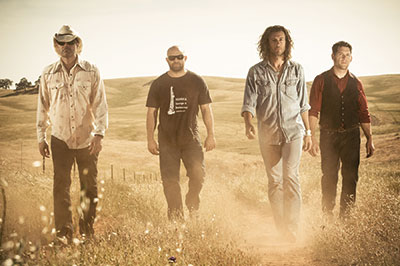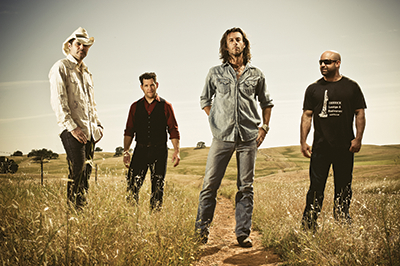BY JEFF HECHT & TISHIN DONKERSLEY, M.A.
 It’s a sunny day in downtown Phoenix, and well over 100 degrees outside, but the tour bus parked in the parking lot across the street from Chase Field, home of the Arizona Diamondbacks, is cool and climate-controlled… and almost fully powered by solar energy and biodiesel fuel.
It’s a sunny day in downtown Phoenix, and well over 100 degrees outside, but the tour bus parked in the parking lot across the street from Chase Field, home of the Arizona Diamondbacks, is cool and climate-controlled… and almost fully powered by solar energy and biodiesel fuel.
The bus is owned by one of the Southwest’s most notable musical acts, Roger Clyne and the Peacemakers, who are performing that evening after the baseball game. Prior to the game, Green Living sat down with Roger Clyne and the band to discuss their efforts to reduce the carbon footprint of their tour, adopt sustainability best practices, and share that philosophy with their diehard fans.
“These things are important because we’ve got 7 billion people and counting on the planet, and each one of us has an impact,” says Clyne. “I think it’s important that each one of us take responsibility for what we do.”
Clyne and the Peacemakers recognized that they could not only live within this philosophy themselves, but spread the word to legions of fans and followers, using the band’s voice and reach to share the importance of recycling and reducing our carbon footprint.
“Every little thing we do has an effect, and we wanted to minimize it,” says Clyne.
Even their tour bus is a showcase in sustainability. When the band realized they’d be touring upwards of 200–220 days a year, they made the decision to purchase a tour bus to extend their reach. Along the way, they made modifications to the bus to make it more energy-efficient and reduce emissions.
“It’s a 1985 ‘reduce, reuse, recycle’ effort, and it’s the fifth member of the band,” says Clyne. “You pay a little money forward, and it helps you to sleep at night knowing you’re doing the right thing.”
“When we blew up an engine in 2005, we were looking for a biodiesel engine with a more efficient emissions system, in order to reduce the ‘footprint’ of our tour,” notes Clyne. “There was time and money invested, in replacing fuel lines, the engine, and the emissions system. We went for the most progressive system possible, far exceeding basic compliance regulations.”
The next addition to the bus came a few years later, when the band decided to invest in running basic interior systems off green fuels, including solar power.
“Basically everything in this bus, with the exception of the air conditioning system, runs on solar power, with four panels mounted on the top of the bus. We do have a generator that acts as a backup system, but we haven’t had to use that yet,” Clyne continues.
Recently, the Peacemakers signed on with Reverb.org, a non-profit organization that educates and engages musicians and their fans to take action toward a more sustainable future. Founded in 2004 by environmentalist Lauren Sullivan and her musician husband, Adam Gardner of the band Guster, Reverb.org provides comprehensive, custom greening programs for music tours while conducting grassroots outreach and education with fans around the globe.
“We ran across Reverb.org through our management company,” explains Clyne, noting that they’ve dedicated themselves to “greening” tours for major acts like the Dave Matthews Band, Guster, and several other touring bands.
“What Reverb.org strives to do is make sure the sustainability opportunities are available, whether a band tours in a 1985 bus like us, or a Learjet.”
Reverb.org also provides the band with a national map of biodiesel fueling locations, allowing them to route tours through areas where they can obtain cleaner-burning biodiesel fuels. They even help the band get closer to a “zero footprint” with supplies like biodegradable and compostable knives, forks, spoons, plates, and cups for use on the bus.
And when it’s time for Thai or Mexican food, the band’s favorites, Reverb.org helps find progressive-minded restaurants along the tour route. “They can identify stops along our route, helping us support places that offer local, organic, and sustainable options within a few miles of our shows,” says Clyne.
Before each show, Clyne promotes the opportunity to help the band with their efforts to recycle, including fans on a “green guest list” if they offer to take away the band’s recyclables to a nearby drop-off center.
“It’s essentially taking out our trash, but we’ve always got fans that want to help us out, and do the right thing for the environment,” says Clyne.
Clyne’s love of his fellow man and his planet are evident in his writing as well, designed to bring people together to share and celebrate good times. And while his messages and beliefs in sustainability and looking after the planet and each other are always on his mind, he doesn’t preach from the stage.
“Our music implicitly has that ethos about it, and while I don’t want to explicitly discuss this from the stage, there’s an underlying ’give what you want to receive’ mentality to our shows,” says Clyne, with a smile.
“It’s the way we’re going to have to live on planet Earth if we want to sustain… keep it clean for future generations,” says Clyne. “We’re going to have to abandon certain conveniences for a more ethical lifestyle, but I don’t believe that has to eat into our quality of life.”
Later that evening, as Clyne took the stage inside Chase Field following the Diamondbacks baseball game, the chorus of the band’s popular song “Mekong” blasts from the sound system and, in unison, the entire crowd sings along with the band’s key message and philosophy ─“Here’s to life!”





